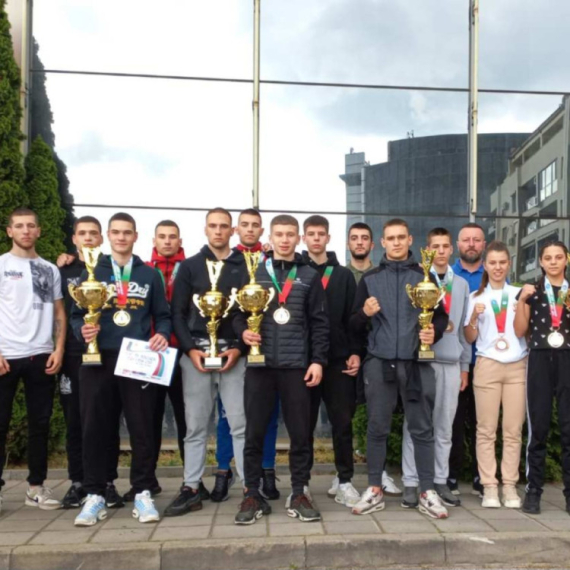Croatia: Wartime murder of police chief trial
The trial of Antun Gudelj, suspected of killing the Osijek police chief in July, 1991, began Tuesday in Croatia.
Wednesday, 10.10.2007.
12:47

The trial of Antun Gudelj, suspected of killing the Osijek police chief in July, 1991, began Tuesday in Croatia. The Osijek District Prosecution has charged Gudelj, a former member of a Croatian police reserve unit, of opening fire from an automatic rifle at cars carrying a delegation sent to negoatiate with the rebelling Serb minority in the village of Tenja in July, 1991. Croatia: Wartime murder of police chief trial Three persons were killed in the shooting, including Josip Reihl-Kir, the Osijek police chief, Goran Zobundzija, the president of the Osijek Executive Council, and Milak Knezevic, a member of the local assembly. Mirko Tubic, the president of the Tenja village community was seriously wounded. Gudelj fled to Australia following the killings. He was tried in absentia and sentenced to twenty years in prison. On November 19, 1995, the Frankfurt airport police arrested him under an international warrant and extradited him to the Croatian authorities. Croatia’s Supreme Court failed to uphold the first instance verdict, and ordered a retrial that was stopped in 1997, when the Supreme Court applied the Amnesty Law in Gudelj’s case, after which he moved to Australia. However, the Constitutional Court in 2001 revoked the Supreme Court’s decision and ordered a fresh trial, after which the Croatian police issued a new warrant for his arrest. Gudelj was arrested in Australia in 2006 and extradited to Croatia in May this year. He has been in custody pending trial ever since. In the proceedings that started today, the wife of Reihl-Kir gave her testimony. She said that her husband’s life had been in danger since the spring of 1991, solely because the extremist wing of the Croatian Democratic Alliance (HDZ) “did not favor the peaceful option for settling the conflict with the rebelling Serbs, advocated by his husband.” “Several days before he was killed, my husband told me that ‘they will have him killed in a traffic accident’, and that, in that case, the Croats would have been responsible, and not the Serbs,” she said. She stressed that several days before the murder, Vladimir Seks, then high official in Osijek belonging to the group of people said to have been against her husband’s peaceful scenarios, called her husband for talks. When Prosecutor Drazen Krizevac asked her whether Reihl-Kir had been more precise as to who wanted him dead, she replied that her husband would almost always mention Branimir Glavas, “the most influential man in Osijek at the time.” She added that Glavas was the one who started a petition for Reihl-Kir’s removal from the chief post in the Osijek police. The Trial Chamber accepted the Prosecution’s motion to summon Angelina Ratkovic, currently residing in Serbia, who witnessed the murder of Reihl-Kir.
Croatia: Wartime murder of police chief trial
Three persons were killed in the shooting, including Josip Reihl-Kir, the Osijek police chief, Goran Zobundžija, the president of the Osijek Executive Council, and Milak Knežević, a member of the local assembly.Mirko Tubić, the president of the Tenja village community was seriously wounded.
Gudelj fled to Australia following the killings. He was tried in absentia and sentenced to twenty years in prison.
On November 19, 1995, the Frankfurt airport police arrested him under an international warrant and extradited him to the Croatian authorities.
Croatia’s Supreme Court failed to uphold the first instance verdict, and ordered a retrial that was stopped in 1997, when the Supreme Court applied the Amnesty Law in Gudelj’s case, after which he moved to Australia.
However, the Constitutional Court in 2001 revoked the Supreme Court’s decision and ordered a fresh trial, after which the Croatian police issued a new warrant for his arrest.
Gudelj was arrested in Australia in 2006 and extradited to Croatia in May this year. He has been in custody pending trial ever since.
In the proceedings that started today, the wife of Reihl-Kir gave her testimony. She said that her husband’s life had been in danger since the spring of 1991, solely because the extremist wing of the Croatian Democratic Alliance (HDZ) “did not favor the peaceful option for settling the conflict with the rebelling Serbs, advocated by his husband.”
“Several days before he was killed, my husband told me that ‘they will have him killed in a traffic accident’, and that, in that case, the Croats would have been responsible, and not the Serbs,” she said.
She stressed that several days before the murder, Vladimir Šeks, then high official in Osijek belonging to the group of people said to have been against her husband’s peaceful scenarios, called her husband for talks.
When Prosecutor Dražen Križevac asked her whether Reihl-Kir had been more precise as to who wanted him dead, she replied that her husband would almost always mention Branimir Glavaš, “the most influential man in Osijek at the time.”
She added that Glavaš was the one who started a petition for Reihl-Kir’s removal from the chief post in the Osijek police.
The Trial Chamber accepted the Prosecution’s motion to summon Angelina Ratković, currently residing in Serbia, who witnessed the murder of Reihl-Kir.


























































Komentari 3
Pogledaj komentare